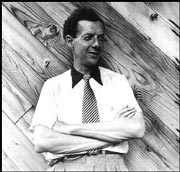FORTY YEARS AGO, if you were to invest in composers’ reputations, it would have been laughable for anyone to suggest that you put your money on Benjamin Britten. The future seemed to belong to the avant-garde, and all critical praise and attention went to European high-modernist composers: Stockhausen, Boulez, Xenakis, and their acolytes. Stockhausen, for example, was considered a towering genius in 1960—a visionary, if not a demigod. Britten was deemed conservative, provincial, lightweight, and committed to tonality even after conventional wisdom pronounced it exhausted.
Since then, however, Britten’s stock has only risen (whereas Stockhausen ended the century as a cult figure, an oddball composer of music notable primarily for its heady intricacy). In a persuasive 1999 New York Times article, Anthony Tommasini dubbed Britten “the Musician of the Century” for his sheer versatility: He not only composed, but conducted (like Strauss and Stravinsky); he performed as a chamber music pianist and lieder accompanist (like Bernstein); he researched and edited early music (like Webern); and he wrote in every genre, including film music (like Copland and Shostakovich). He was also an impresario, founding Britain’s Aldeburgh Festival and turning it into one of the most important and new-music-friendly centers in Europe. One might also mention Britten’s prescient interest in world music; as Noh and gamelan evocations found their way into his later works, he turned out to be in the forefront of what arguably has been the most important development in the classical tradition in the last few decades.
Britten has also benefited from postmodern identity politics and its influence on scholarly and critical thought—a major focus of literary studies for some time, though music analysis has picked up the ball only recently. Philip Brett’s article on Britten in the latest edition of Grove Dictionary of Music and Musicians is something of a milestone in gay and lesbian musicology, examining Britten’s work with a frank eye toward his gayness, neither using it as a one-size-fits-all interpretive lens nor squeamishly ignoring it.
While it would be hard to argue that sexuality leaves its traces in the actual selection of sounds in the composition process—i.e., Composer X wrote an F-sharp rather than an F for the second trombone on the fourth beat of bar 317 in the finale of his Symphony no. 12 because he was gay—it would be just as hard to argue that, in Britten’s case, his homosexuality didn’t influence his choice of, say, opera subjects: Male/male erotic attraction is overt in his A Midsummer Night’s Dream and Death in Venice, and subtextual but unmistakable in Billy Budd and The Turn of the Screw; it can be illuminating, too, to read Peter Grimes and Albert Herring—the title roles of which were written especially for his companion, tenor Peter Pears—as allegories of gay alienation.
And it’s not so much orientation, per se, but the way an artist’s sexuality sets him in conflict with his society that colors his art (“Queer & left & conshies [conscientious objectors] . . . apart from being artists as well,” is how Pears described the two of them). Grove‘s Philip Brett maintains that Britten used his position on society’s margin to comment on and subvert traditional hierarchies, even in instrumental music: For Mstislav Rostropovich he wrote a Cello Symphony, a “discourse between equal forces” rather than an I-am-the-star concerto, in which the solo cello at one point “democratically” provides the orchestral bass line.
Finally, Britten’s reputation has risen simply because his work has lasted—sometimes it takes a while for critical consensus to catch up with the music people actually perform and want to hear. And it’s the musicians, don’t forget, who make the programming decisions, playing what they deem worth their time and effort. Whatever the vagaries of its critical acceptance or dismissal, Britten’s music—elegant, eloquent, and strikingly personal—has never been far from musicians’ hearts.
gborchert@seattleweekly.com 
Britten’s 1961 Cello Sonata, also written for Rostropovich, will be played by Bion Tsang and Adam Neiman as part of the Seattle Chamber Music Society’s Winter Interlude at Benaroya Recital Hall, Third and Union, 206-283-8710. $15-$32. 3 p.m. Sun., Jan. 12.







